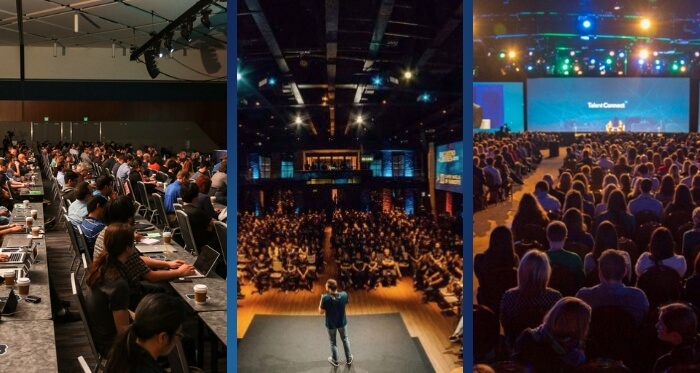Exploring the tasty and complex food world needs a special place to find new trends and look at creative ideas. That’s where a food conference comes in. Now you might find yourself pondering, What is a Food Conference?
Well, it’s a dynamic gathering that plays a crucial role in shaping our culinary future. This melding of minds allows professionals, enthusiasts, and participants to discuss, share, and explore prevalent trends, vital research, and pioneering innovations in the industry, ensuring a holistic approach towards topics like nutrition, sustainability, culinary techniques, and appreciating global cuisines.
By participating or even merely observing, one can not only satisfy their gastronomic curiosity but also devise solutions to the pressing issues our food industry faces, thereby ensuring its sustainable and palatable future.
What is the Purpose of the Conference?
The conference brings experts together to share ideas, solve problems, and create new opportunities for growth and learning. Attendees can network with professionals, gain knowledge from speakers, and explore new trends shaping their industries. People join these events to develop skills, exchange perspectives, and find inspiration to improve their work and businesses.
Many countries hold major conferences, but conferences in Canada offer unique experiences with global experts, diverse industries, and innovative discussions. These events help professionals connect, learn modern strategies, and discover insights that drive success in various fields. Whether someone wants business insights, academic knowledge, or new connections, conferences in this country provide great value and opportunities.
A good conference provides more than lectures—it sparks discussions, builds strong networks, and introduces new ways of thinking. Participants leave with fresh ideas, better skills, and the motivation to achieve greater goals. Learning, collaboration, and engagement make every event a valuable experience.
What is a Food Conference?
The field of gastronomy is always changing due to innovation and the pursuit of knowledge. A crucial question at the center of this venture is: What is Food Conference? These events highlight the complexities and innovations in the food sector.
Exploring the heart of these events, a food conference serves as a hub for professionals, enthusiasts, and industry stakeholders. They congregate to dissect, share, and explore emerging trends, ground-breaking research, and revolutionary techniques in culinary arts. This collaborative space fosters deep insights into topics ranging from nutrition and sustainability to global cuisines.
Additionally, an international food conference plays a significant role in personal and professional enrichment. Attendees immerse themselves in a rich tapestry of knowledge, gleaning fresh perspectives and honing their culinary skills. Amidst diverse seminars and workshops, participants find inspiration, rekindling their passion for the culinary world.
Lastly, these gatherings don’t just reflect the present state of the food industry. They actively shape its future trajectory, setting standards and pioneering novel approaches. By highlighting and deliberating on the latest findings, food conferences drive the evolution of gastronomic arts, ensuring its perpetual growth and relevance.
Types of Food Conferences for Attendees
Professionals and enthusiasts frequently search for events that meet their particular requirements and interests while exploring the culinary scene. With its varied services, food conferences serve different segments of the industry. Here are the various types that draw visitors from all over the world.
Culinary Arts Symposiums
These events celebrate the artistry of cooking, showcasing innovative techniques and presentations. Renowned chefs often conduct workshops, demonstrating their skills. Attendees gain hands-on experience and refine their craft.
Nutrition and Wellness Conventions
Focused on health and well-being, these conferences emphasize the relationship between food and wellness. Dietitians, nutritionists, and health experts share insights on balanced diets and holistic health. Participants leave equipped with knowledge to make informed dietary choices.
Sustainable Food Summits
Addressing the pressing need for sustainable practices, these conferences explore eco-friendly food production. Topics include organic farming, reducing food waste, and sustainable packaging. They emphasize a future where food production harmonizes with nature.
Global Cuisine Gatherings
These events spotlight cuisines from various corners of the world. Attendees immerse themselves in diverse culinary traditions, flavors, and techniques. It’s a gastronomic journey, bringing global dishes to the forefront.
Food Technology Forums
Marrying tech with gastronomy, these forums delve into advancements like food apps or kitchen gadgets. Experts discuss innovations like 3D food printing and smart kitchen appliances. Attendees discover how technology reshapes culinary experiences.
Food Business Conclaves
Aimed at industry stakeholders, these conclaves discuss market trends, branding, and entrepreneurship. Business leaders share strategies for successful food ventures. Aspiring entrepreneurs and veterans alike gain insights into the business side of food.
Food conferences offer a myriad of opportunities for exploration and learning. Depending on one’s interests, there’s undoubtedly a gathering that aligns with their culinary passions and aspirations.
Key Components of Food Conferences
Food conferences are multifaceted events that bring together professionals and enthusiasts from various culinary backgrounds. To ensure their success, several essential components are integral to these gatherings.
Diverse Speakers
Food conferences feature a lineup of speakers from diverse fields within the food industry, including chefs, nutritionists, researchers, and entrepreneurs. This diversity of expertise ensures a well-rounded program with insights spanning from culinary arts to dietary science.
Interactive Workshops
Workshops and hands-on sessions allow attendees to gain practical skills and knowledge. These interactive experiences often cover cooking techniques, tastings, and culinary demonstrations, offering participants the chance to refine their culinary prowess.
Networking Opportunities
Building connections is a fundamental aspect of food conferences. Attendees can network with peers, potential collaborators, and industry leaders, fostering professional growth, culinary partnerships, and business opportunities.
Exhibits and Vendor Booths
Many food conferences include exhibits and vendor booths where companies showcase their products and services. Attendees can explore the latest culinary innovations, discover new ingredients, and access state-of-the-art kitchen equipment.
Educational Seminars
Educational seminars delve into a wide range of topics, from food safety and sustainability to culinary trends and consumer behavior. These sessions provide valuable insights and knowledge-sharing, empowering attendees with practical takeaways and industry know-how.
These key components collectively create an enriching and informative experience for attendees, ensuring that food conferences remain valuable and relevant gatherings within the food industry.
Tips for Choosing the Right Food Conference
The myriad of food conferences available today can overwhelm even the most seasoned professionals. Choosing the right one is crucial to maximize benefits and meet specific goals. Here are some tips to guide your decision-making:
- Define Your Objective: Know what you seek from the conference, whether it’s learning, networking, or business opportunities. A clear goal helps filter relevant events.
- Research Speakers: Review the list of keynote speakers and presenters. Top-notch experts often indicate a conference of high quality and relevance.
- Evaluate Content: Assess the topics and sessions offered. Ensure they align with your interests and offer fresh, innovative insights.
- Consider Location and Logistics: Is the venue easily accessible? Factor in travel, accommodation, and logistical ease before making a choice.
- Check Feedback: Look for reviews or testimonials from past attendees. Their experiences can provide valuable insights into the event’s quality.
- Budgetary Constraints: While investing in growth is vital, ensure the conference fits within your financial capacity. Remember to account for hidden costs too.
- Networking Opportunities: A good conference should offer ample chances for interactions. Gauge the potential for meaningful connections and collaborations.
- Workshop and Hands-on Sessions: Prioritize conferences that offer interactive learning experiences. Hands-on workshops can be more impactful than passive listening.
- Size and Scale: Some prefer intimate gatherings, while others thrive in larger events. Choose based on your comfort and networking style.
- Future Opportunities: Consider the potential long-term benefits. Some conferences may offer post-event resources, courses, or follow-up sessions.
Conclusion
When we ask “What is a food conference?”, we’re diving into a world that brings together people who are passionate about food. These events are more than just meetings. They create a space where chefs, nutritionists, and even food lovers can come together to explore new ideas, share knowledge, and learn about the latest trends in the culinary world.
These gatherings offer something for everyone, from discussions about tasty global cuisines to deep dives into the science of nutrition. It’s a place where a love for cooking meets a passion for learning, and where new connections are made. For professionals, it’s a chance to get to know others in their field, share their work, and find new opportunities for collaboration.
Food conferences provide an exciting chance to learn, explore, and connect with others who share similar interests. Whether it’s discovering a new cooking technique, exploring innovative food technologies, or discussing the future of sustainable eating, Those who are interested in food and cookery can benefit from these events.








